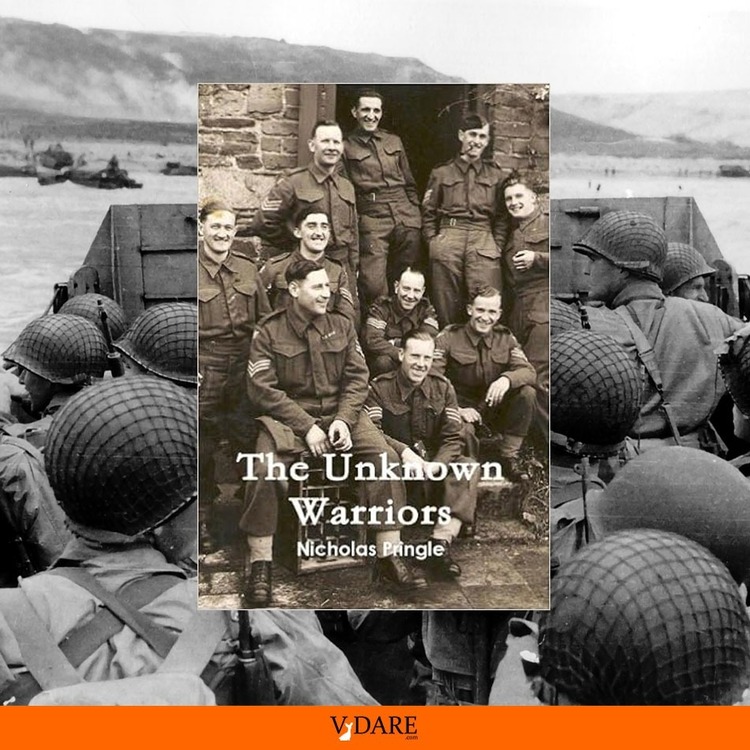


06/07/2024
[Adapted from the latest Radio Derb, now available exclusivelyon VDARE.com]
Earlier, by Peter Brimelow: DUNKIRK: “People Should Be Hung From Lampposts, They Should Be Burned Alive, For What They’ve Done To Britain”
A lot of people have been posting on social media that if the heroes of D-Day had been able to see what would happen to their countries — mainly the USA, Britain, and Canada — they would not have fought.
Here’s a post at X I’ve just been looking at: an old black’n’white photograph of Allied troops going into battle with, superimposed on it, a thought balloon coming out of one soldier’s head saying: “I hope my grandchildren become minorities in their own country.”


There is documentary support for that bitter sarcasm, at least in the U.K. Back in 2006 British author Nicholas Pringle published an appeal in the local newspapers of his country asking for men and women who’d fought or served in WW2 to offer their memories, and their opinions as to whether all the sacrifices had been worthwhile.
Pringle got enough responses to publish them as a book of over five hundred pages, title The Unknown Warriors, which you can buy on Amazon.
The vlogger who calls himself Zoomer Historian has posted a one-hour YouTube video about Pringle’s book under the heading “Do British Veterans Regret Fighting World War 2?”
Pringle’s respondents were Brits (and a few Australians and New Zealanders) in their eighties and nineties, so of course you have to discount some of those responses for the natural and universal tendency of geezers to think that the past was better than the present, without altogether discarding the truth I started out with: that in some respects the past was better than the present.
Even discounting for ordinary geezer grumbling, though, Pringle’s respondents were remarkably negative [’This isn’t the Britain we fought for,’ say the ’unknown warriors’ of WWII, by Tony Rennell, London Daily Mail, November 21, 2009]. Here is the voice of Zoomer Historian talking about Pringle’s book. This starts at 51m13s into the YouTube clip. The title of the clip, once again: “Do British Veterans Regret Fighting World War 2?”
Clip: This video could have gone on for hours. Since the sentiments of all the responses tended to be much the same, I thought I’d spare you the trouble. Instead I settled for writing down the general trends.
I also made a tally of positive and negative responses. Bear in mind I went into this video expecting a rather even split.
There were 182 responses in total. Of those, 30 seemed to be a little confused on the assignment and just gave a recount of their war experiences and didn’t touch on how Britain has changed.
Three — yes, that’s right: only three — of the responses in the entire 500-page book were positive. All three have been quoted above and all three were positive due to personal financial success.
So naturally that leaves the rest, meaning there were 149 negative responses. The numbers speak for themselves.
As for the trends, here is what I noticed. I will simply read them out and let you make your own conclusions.
Firstly, immigration was by far the biggest complaint. Almost every response mentioned it. Of these immigrants it was mostly Muslims and also blacks from the Caribbean who were viewed the most negatively. Not one person referred to immigration positively.
That’s a British perspective, but it maps pretty well into what I hear from American vets and see on social media. It also calls to mind some of the problems and paradoxes of immigration control.
Pringle’s respondents are WW2 vets, which means they are geezers. Hindsight is proverbially 20-20. Those vets, and geezer-adjacent Brits and Americans like your genial host who can clearly remember their nations as they were sixty or seventy years ago, understand the blessings of demographic stability better than do younger citizens who grew up hearing authority figures tell them it was wicked to think about such things.
And then there’s the issue of why, when the immigration catastrophe got under way — which in Britain was during the 1960s, in the USA somewhat later — why didn’t that senior generation, who were working adults and voters at the time — why didn’t they vote to stop it? We are democracies, aren’t we?
The fact that it was a catastrophe, with dire consequences for the nation’s future, was already plain back then. For those who didn’t see it, the great British politician Enoch Powell gave his fellow countrymen a warning as loud and eloquent as it could possibly be in 1968, to widespread applause. And yet the demographic destabilization went on, from strength to strength.
How could that be, in a country under representative government? Why didn’t citizens vote to stop it? I have pondered that at length many times on Radio Derb.
And that too maps into the present-day U.S. situation. Even setting aside legal immigration, which badly needs addressing, uncontrolled mass illegal immigration is causing dramatic, expensive, unwanted changes in our national life.
Yet the politicians allowing it to happen, even encouraging it, are polling decently well. Current voting intentions for the Presidential election in November show 44 percent of voters favoring Joe Biden, who has thrown our borders wide open.
On immigration, only 41 percent of us want the numbers decreased. Twenty-six percent — better than one in four — want them increased.
Does a quarter of the U.S. population really dislike their country, its character, its history, and their fellow citizens that much? I guess so.

John Derbyshire writes an incredible amount on all sorts of subjects for all kinds of outlets. (This no longer includes National Review, whose editors had some kind of tantrum and fired him.) He is the author of We Are Doomed: Reclaiming Conservative Pessimism and several other books. He has had two books published by VDARE.com com: FROM THE DISSIDENT RIGHT (also available in Kindle) and FROM THE DISSIDENT RIGHT II: ESSAYS 2013.
For years he’s been podcasting at Radio Derb, now available at VDARE.com for no charge. His writings are archived at JohnDerbyshire.com.
Readers who wish to donate (tax deductible) funds specifically earmarked for John Derbyshire’s writings at VDARE.com can do so here.